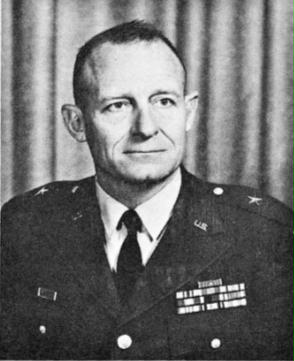Charles Myer; General Was Communications Expert for Army
By Matt Schudel
Courtesy of the Washington Post
Saturday, May 19, 2007
Charles Robert “Bob” Myer, 83, an Army Lieutenant General who was an internationally known leader in developing networks for military communication, died April 30, 2007, of a heart attack at his home in Warrenton, Virginia.
Beginning in the 1950s, General Myer became a specialist in electronic communications for the military, with a particular specialty in combat communications. In 1965, when he was commander of the 69th Signal Battalion at Fort Eustis, Virginia, he was deployed to Vietnam, where he led his 1,300-member battalion in setting up the communications network in Saigon and other key places throughout the country.
He was assigned to other commands in the United States and Europe before serving a second tour of duty in Vietnam in 1972.
In 1974, General Myer was named Commandant of the Army Signal School and commander of the Army Signal Center, both at Fort Gordon, Georgia. In this position, he helped establish and coordinate communications methods and computer networks throughout the Army.
His later positions included director of telecommunications and command and control; deputy chief of staff for operations and plans; and assistant chief of staff for automation and communications at the Pentagon. In that post, he implemented Army-wide command, control, communications and computer programs — “C4,” in military terms — and was an adviser to the president and vice president.
General Myer’s final posting in the Army was as deputy director general of the NATO Integrated Communications Management Agency in Europe, where he planned, engineered and installed communications systems in 14 NATO countries. He retired from the Army in 1981. His awards included the Defense Distinguished Service Medal and two awards of the Legion of Merit.
After retiring from the military, General Myer was a senior consultant with Unisys Corp. for about 15 years. In 1994, he was named the first recipient of the Eugene G. Fubini Award of the National Security Industrial Association for his contributions to defense communications. He was inducted as a distinguished member of the Army Signal Corps Regiment in 1997.
General Myer was born in Wellsburg, West Virginia, and graduated from the U.S. Military Academy in 1946. (His son and grandson later graduated from West Point.)
He served in the Army of Occupation in Japan from 1946 to 1950 and received a master’s degree in electrical engineering from the University of Illinois in 1952. He served in Japan again from 1956 to 1959.
He wrote many articles on military communications and was the author of “Vietnam Studies: Division Level Communications, 1962-1973” (1982). He lived in McLean and Alexandria before moving to Warrenton 10 years ago.
He enjoyed playing guitar and entertaining guests with songs and poems that he wrote. He was studying biology, piano and photography at the time of his death.
His wife of 39 years, Winifred Myer, died in 1986.
Survivors include his wife of 20 years, Gulli Hartvigsen Myer of Warrenton; three children from his first marriage, retired Army Colonel Steve Myer of Huntsville, Alabama, May Kristensen of Cary, North Carolina, and David Myer of Ashburn; a stepson, Phillip Pisciotta of New York; six grandchildren; and six great-grandchildren.
CHARLES ROBERT “BOB” MYER
Lieutenant General, USA, (Ret.)
On April 30, 2007 at his home in Warrenton, Virginia; beloved husband of Gulli Hartvigsen Myer; father of Steve Myer, Huntsville, Alabama, Mary Kristensen, Cary, North Carolina, David Myer, of Ashburn, Virginia; stepfather of Phillip Pisciotta, New York, New York. Also survived by six grandchildren, and six great-grandchildren.
A memorial service will be held on Thursday, July 19, 2007 at 1 p.m. at the Fort Myer Chapel, Fort Myer, Virginia. Interment in Arlington National Cemetery with Full Military Honors. Memorial contributions may be made to the Army Emergency Relief, 200 Stovall Street, Alexandria, Virginia 22332
Michael Robert Patterson was born in Arlington and is the son of a former officer of the US Army. So it was no wonder that sooner or later his interests drew him to American history and especially to American military history. Many of his articles can be found on renowned portals like the New York Times, Washingtonpost or Wikipedia.
Reviewed by: Michael Howard

